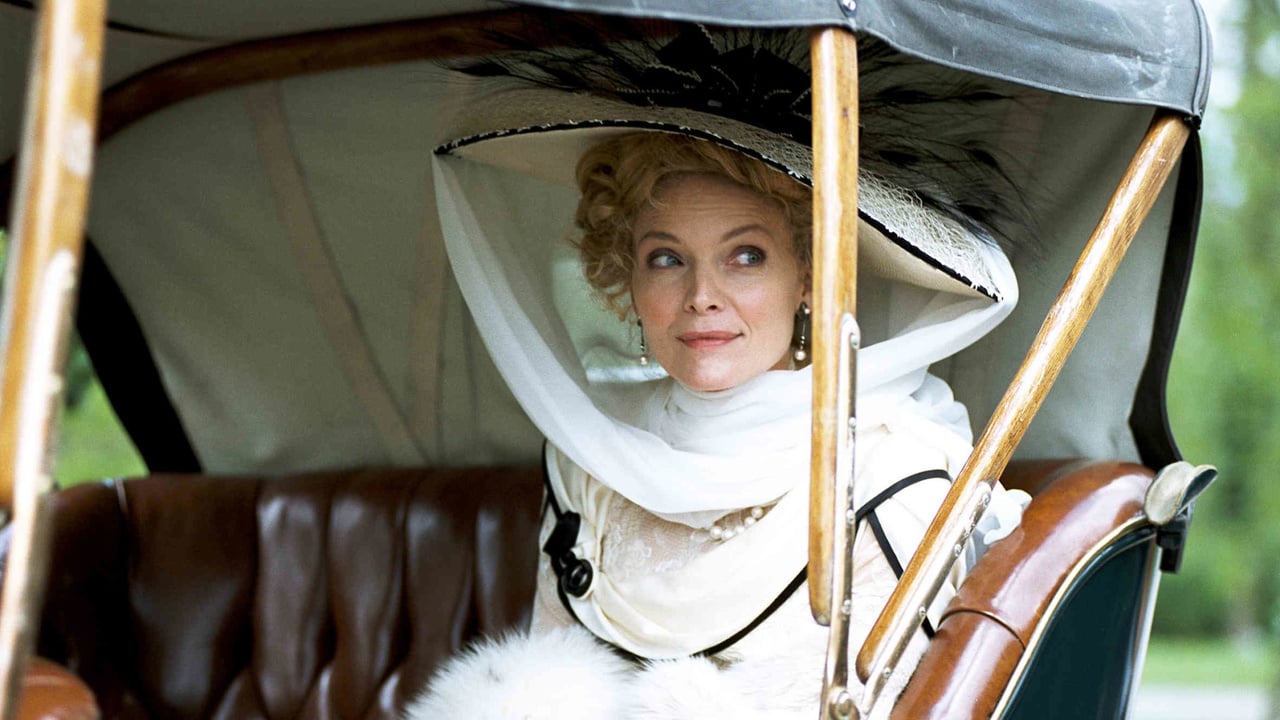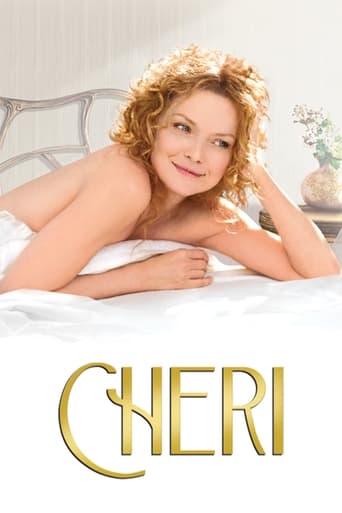

charming for actors more than for story. trip around a world like an ice cream. love and interests and humor and relations and secrets and seduction as refined art. short, a nice adaptation, provocative for the flavor of an universe who seems be part of Dangerous Liaisons, wise lesson about science to explore detail and an impressive cast doing its the best. and, sure, Michelle Pffeifer. in a role who seems be her perfect tool for translate emotions and shadows of an age and impossibility of the right option.
... View More"Cheri," based on the novels by French author Colette, is not a film targeted at men in their early twenties, nor is it the type of film I would have autonomously sought out, however the power of a free screening will dispel just about any of my cobwebbed genre prejudices, at least so far as putting me in a seat. "Cheri," unfortunately, is neither a particularly compelling love story nor a particularly convincing period piece. Stephen Frears, who helmed 2006's Oscar-baiting "Queen," but is perhaps best known for heady romcom "High Fidelity," directs, and though the most glaring issues with the film are issues with the screenplay as an adaptation, Frears' direction doesn't elevate the occasionally interesting banter or the by- the-numbers romantic beats.The bottom line is that "Cheri" plays it safe. For a story about an intergenerational relationship between a moody teenager (Rupert Friend) and a retired lady of the evening (Michelle Pfeiffer), "Cheri" risks offending exactly no one. The film is apparently R-rated, which is puzzling, as the scenes of sensuality barely border on the suggestive, and I completely fail to recall the "brief drug use" outlined by the MPAA. It's a sallow, forgettable piece of film-making that owes its only redeeming qualities to earlier, edgier artists. "Harold and Maude," for example, sort of broke the age barrier for romance films back in '71, and the cinematic landscape is peppered with more interesting depictions of prostitutes."Cheri" also lacks a consistent, elegant art direction, usually a staple in even mediocre period pieces. Production designer Alan MacDonald's costumes are gaudy and caricatural, though perhaps impressive if only for their sheer audacity. If widest sunhat diameter or most phosphorescent gown are new categories at this year's academy awards, "Cheri" has them in the bag. Macdonald's set design also under-impresses, rarely providing more than a stodgy veneer of the early nineteenth century, a chasm between the source material that's only widened by the wincingly mawkish dialogue. Christopher Hampton's screenplay paints Lea and her eponymous partner Cheri as cardboard lovers, and Pfeiffer and Friend's sexual chemistry is almost non-existent.The rest of the performances are passable, though the inauthentic dialogue is a constant stumbling block, even for the usually-stellar Kathy Bates, who seems oddly defanged and miscast in her supporting role as Cheri's manipulative mother. The characters are veiled in a layer of faux-elegance, feeling more often like uniformed impressions of turn-of-the- century women than the genuine article. The suspension of disbelief is kept at arm's length.But I don't mean to suggest that "Cheri" is at all a worthless film; it's just an unnecessary one, which is almost as bad. The story itself is adequate, but has no strong reason for existence. Colette's novels ("Cheri" and "The Last of Cheri"), which were combined for the film version, saw publication in France in 1920 and 1926 respectively, assumedly to a more scandalized audience then today's, which were so recently witness to the spectacle of Sacha Baron Cohen's "Bruno.""Cheri" is too reserved a film to justify recommendation. It brings nothing new to the film-making landscape in either content or craft, and though the score by Alexandre Desplat is impressive, probably the picture's highlight, it seems to have wandered into "Cheri" from some more interesting film, upbeat and suspenseful while the plot is languid and sedentary.I don't think I'm letting my prejudice get the better of me in the case of "Cheri." Romance fan or no, there isn't a clear reason why Frears' latest is worth seeking out, even for free.
... View MoreIt is difficult to do justice or condemn this film. From the start it hits a jarring note: cards flying like swift balloons (while the air blows out of them?) of plump fin-de-siecle belles and then the bony Michelle? This is something else than tongue-in-cheek.The design, the palette, the clothes are sumptuous, sometimes stunning. Also, particularly the stage set, is so self-knowingly, amusingly, coldly theatrical. I mention this because in such demi-monde, quasi-moral tales the sets set the tone, either of the narrative, of the allegorizing moral, of the wry, detached humor, or of the quasi-queasy lifelessness.Oh! It is the Belle Epoque - a funnily voiced narrator always intrudes, as if to mock the moral tone of such a proceeding and also to pinpoint the self-mockery of what he narrates - and a courtesan high and slowly retired falls for a so much younger lover, the son of a "colleague", while entertaining a detached air and the illusion that experience can be bemused and amused by passion, having achieved some sort of self mastery.It all proves so misinformed; the couple, after six years on the frothy float of erotic bliss, runs out of the proverbial champagne: we are introduced to the moment of crisis with just enough foregrounding in the beginnings of their liaison, and introduced in a bizarrely appropriate way: Cheri trying on a pearl necklace debates whether he should have it, since it looks so much better on him. It is deliciously epicene the way it is presented, with just the right amount of clueless poutiness by Cheri and strikes an ominous note that in a way is matched only in the end, after a painstaking cinematic, wandering arch. They seem to know they run out of champagne, but they still want to dissolve pearls in it, for the taste and the thrill. The problem with this film is the directorial approach: I am not sure I have grasped what Mr. Frears tries to accomplish after decades of film-making, that much being sure: the film's looks are too sumptuous for them to match the guignol sensibility of Colette's subtle humor. But let's say, leave it as it is, let it be more on the English side (or to the American one with Kathy Bates being as continental as a burger) than on the French one. Mr. Frears is usually portraying women, but his method here fails: an empty face in the end (reminnicent of Glenn Close's at the end of the "Liaisons"), is what it makes it awkward: I do not think Colette invested in any sense of tragic morality. Instead her tone is more mischievous, as suits the French. That does not mean she is not sympathetic to her characters, but rather that it is out of this sensibility's context if one saves or loses face. I would go as far as claim that Colette would not subscribe to the notion that women have a face; it is difficult with such a claim to achieve mischievous entertainment.It is also jarringly funny the fact that Colette and Rupert Friend, courtesy of make-up and wig, look alarmingly alike. Was this a way-too-inside note for Colette's lesbianism? Anyway, as it is, the film's rich cinematography captures the pearly perfection of Cheri's skin-tone, courtesy of Mr. Friend's English complexion.Perhaps one should take the ending titles as a key to how one should watch this film: panels slide one on top of the other; panels of letters evoking amorous ones, panels of tapestry evoking interiors where painful and delicious meetings take place, and screens behind which people get naked and clothed.
... View MoreLet's see; Michelle Pfeiffer is 51, and Rupert Friend is 28. A typical cougar relationship, except there were no cougars in the late 19th Century France, during the Belle Epoque.This is a period of excess and Lea de Lonval (Pfeiffer) is living on her earnings, and she is teaching Cheri (Friend). the son of a friend (Kathy Bates), a fellow retired prostitute, about life. After six years of companionship, she has grown attached to Cheri, and is dismayed to learn his mother wants him married to the daughter (Felicity Jones) of another prostitute (Iben Hjejle).It is definitely a period piece with lavish costumes and sumptuous living, and emotions the rule of the day.What should have been a French film is decidedly English, but it was enjoyable nonetheless.
... View More